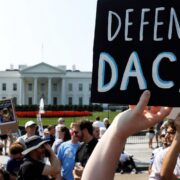
New applications will not be accepted for Deferred Action for Childhood Arrivals (DACA), a program that has prevented certain young undocumented immigrants from being deported, the Department of Homeland Security said in a memo on Tuesday, July 28.
This move comes despite the Supreme Court ruling on Thursday, June 18 that said the Trump administration’s effort to end the Obama-era program was “arbitrary and capricious” in that it violated the Administrative Procedure Act.
Effective immediately, as the department undergoes a “comprehensive review” of DACA, no new or pending applications will be considered.
“I direct DHS personnel to take all appropriate actions to reject all pending and future initial requests for DACA, to reject all pending and future applications for advance parole absent exceptional circumstances, and to shorten DACA renewals consistent with the parameters established in this memorandum,” Chad Wolf, acting Secretary of Homeland Security, wrote in the memo.
Though renewals for the program are still allowed, they will be granted for one year instead of two years.
The DHS will “limit the period of any deferred action granted pursuant to the DACA policy after the issuance of this memorandum (and thereby limit the period of any associated work authorization) to one year,” read the announcement.
Earlier this month, Judge Paul Grimm of the U.S. District Court for the District of Maryland ruled that the Trump administration must restore DACA to “pre-September 5, 2017 status” after new applications weren’t being accepted after the high court’s ruling.
Former President Barack Obama announced the executive order in June 2012, which has shielded approximately 800,000 undocumented immigrants, called “Dreamers,” who arrived in the U.S. as children from deportation. They must have arrived in the U.S. before the age of 16 and be under the age of 30 when the DHS implemented the policy that year.
Aside from being able to stay in the U.S., recipients, who could renew every two years, were able to work legally which allowed many to pursue higher education and pursue other career goals.
In 2017, President Donald Trump first moved to end the program, arguing that Obama overstepped his authority in introducing the policy.
“I do not favor punishing children, most of whom are now adults, for the actions of their parents. But we must also recognize that we are a nation of opportunity because we are a nation of laws,” Trump said in an announcement back then and called on Congress to address the immigration issues.
At least 16,000 DACA recipients are of Asian American or Pacific Islander (AAPI) descent, civil rights organization Asian Americans Advancing Justice said.
Between 2012 and 2017, 3,880 Filipinos were granted DACA protection, according to the U.S. Citizenship and Immigration Services (USCIS), as previously reported by the Asian Journal.
Following the Supreme Court’s ruling, Filipino Dreamers argued that the fight is not over until there is a legal pathway for them to become citizens.
“We will continue to fight until DACA recipients like me have a permanent pathway to citizenship,” Raymond Portolan, a Filipino Dreamer living in Atlanta, Georgia, previously told the Asian Journal. “We dodged a bullet, but DACA was and always will be a temporary solution to a greater issue.”






